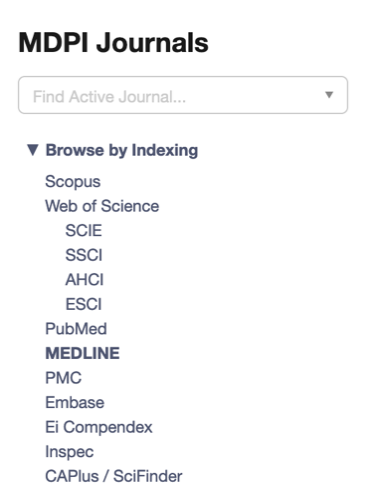
Journal Menu
► ▼ Journal Menu-
- Brain Sciences Home
- Aims & Scope
- Editorial Board
- Reviewer Board
- Topical Advisory Panel
- Instructions for Authors
- Special Issues
- Topics
- Sections & Collections
- Article Processing Charge
- Indexing & Archiving
- Editor’s Choice Articles
- Most Cited & Viewed
- Journal Statistics
- Journal History
- Journal Awards
- Society Collaborations
- Conferences
- Editorial Office
Journal Browser
► ▼ Journal BrowserNeed Help?
Announcements
13 September 2024
Meet Us at the American Congress of Rehabilitation Medicine (ACRM) 101st Annual Conference, 31 October–3 November 2024, Dallas, USA
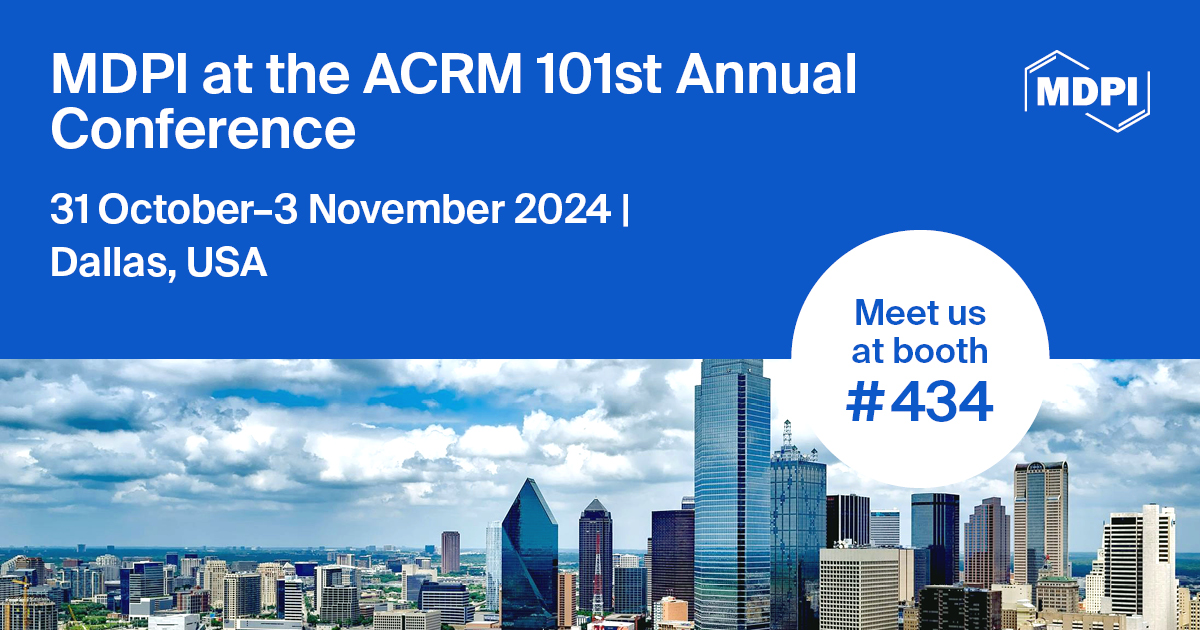
MDPI will attend the American Congress of Rehabilitation Medicine (ACRM) 101st Annual Conference. Great minds come together at the ACRM Annual Fall Conference, the place to fuel creative energy, promote innovation and spark collaboration—the kind of collaboration needed to help bring the latest science into practice faster. With 150+ inter-professional groups at ACRM, including community groups, committees, and task forces, the 100th anniversary conference is planning 4 powerful plenaries, 15+ symposia, 300+ educational sessions, symposia and lectures, and 600+ scientific papers and digital poster presentations.
The mission of ACRM is to enhance the lives of those with disabling conditions through interdisciplinary research. To optimize patient care, it is essential for researchers to effectively communicate their findings, and for clinicians to provide valuable feedback to inform and advance research efforts. The objective of the ACRM 101st annual conference is to foster engagement among attendees, encouraging discussions and collaborations that will propel the field of physical medicine and rehabilitation forward.
The following MDPI journals will be represented:
- Healthcare;
- IJERPH;
- Behavioral Sciences;
- Trauma Care;
- Nursing Reports;
- Brain Sciences;
- JFMK;
- Biomechanics;
- Prosthesis;
- EJIHPE;
- Sensors;
- Sclerosis.
If you plan on attending this conference, please feel free to stop by our booth #434 and start a conversation with us. Our delegates look forward to meeting you in person and answering any questions that you may have. For more information about the conference, please visit https://conference.acrm.org/.
11 September 2024
MDPI’s 2023 Best PhD Thesis Awards—Winners Announced
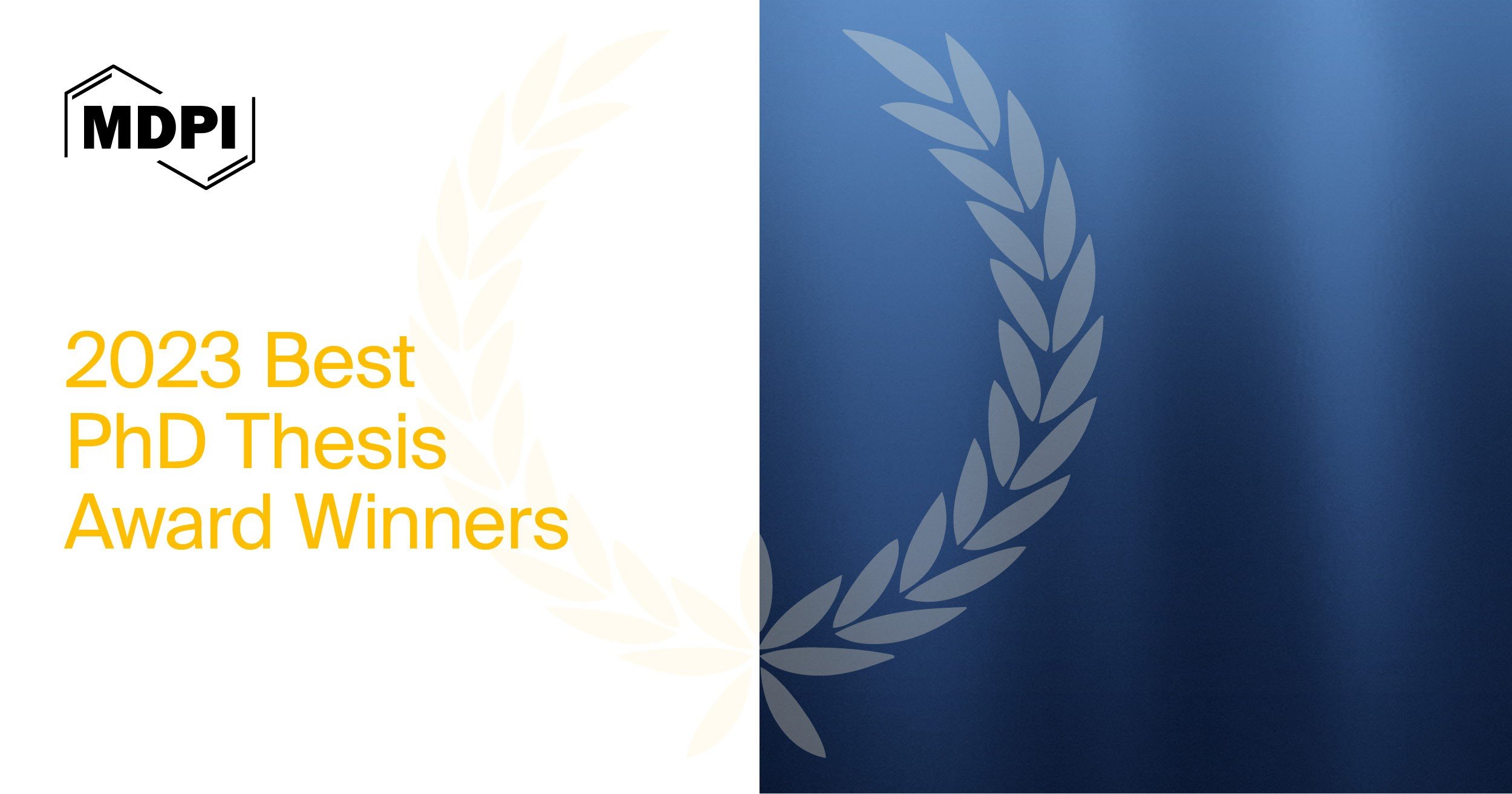
MDPI’s Best PhD Thesis Awards are granted to promising young scholars whose PhD theses are deemed exceptional within their respective research fields. These awards aim to encourage young scholars to continue their outstanding accomplishments and further contribute to their field.
We extend our heartfelt congratulations to the 54 winners of the 2023 Best PhD Thesis Awards and wish them success with their future research endeavors.
MDPI will continue to provide support and recognition to the academic community. To learn more about all the awardees and their research projects in your field of study, please visit the following pages:
About MDPI Awards:
To reward the academic community, especially young researchers, and enhance communication among scientists, MDPI journals regularly offer various awards to researchers in specific fields. These awards, serving as a source of inspiration and recognition, help raise the influence of talented individuals who have been credited with outstanding achievements and are making a significant contribution to the advancement of their fields.
To explore more MDPI awards, please click here.
3 September 2024
MDPI INSIGHTS: The CEO's Letter #15 - CHORUS, Best Paper Award, August Events

Welcome to the MDPI Insights: The CEO's Letter.
In these monthly letters, I will showcase two key aspects of our work at MDPI: our commitment to empowering researchers and our determination to facilitating open scientific exchange.
Opening Thoughts

I am pleased to share that MDPI is now an Affiliate Member of CHORUS, a not-for-profit organization dedicated to ensuring public access to articles reporting on U.S. government-funded research. This partnership highlights our long-standing commitment to advancing Open Access (OA) publishing and meeting funders’ open research requirements.
Read the full announcement here.
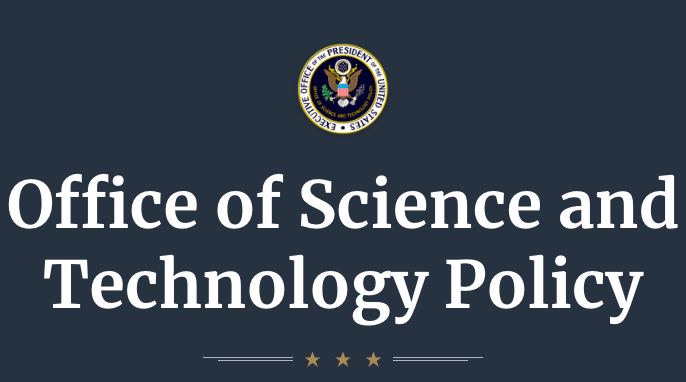
With the White House Office of Science and Technology Policy (OSTP) 2022 memorandum calling for immediate public access to all federally funded research by 2026, this partnership positions MDPI to further support academic institutions in adhering to national mandates while providing authors with fully compliant (CC-BY) OA journals.
The CHORUS platform went live in July 2014 and includes NASA, the U.S. Department of Energy, the U.S. Department of Defense, the U.S. Geological Survey, and the National Science Foundation.
“This partnership positions MDPI to further support academic institutions in adhering to national mandates”
Joining CHORUS perfectly aligns our mission as the leading OA publisher, which is to drive transparency and innovation in scholarly publishing, with that of CHORUS itself, which is to advance Open Access research. It will also support MDPI publications from organizations such as NASA, with 1,200 research papers published by NASA-affiliated authors as at 31 August 2024.
Impactful Research
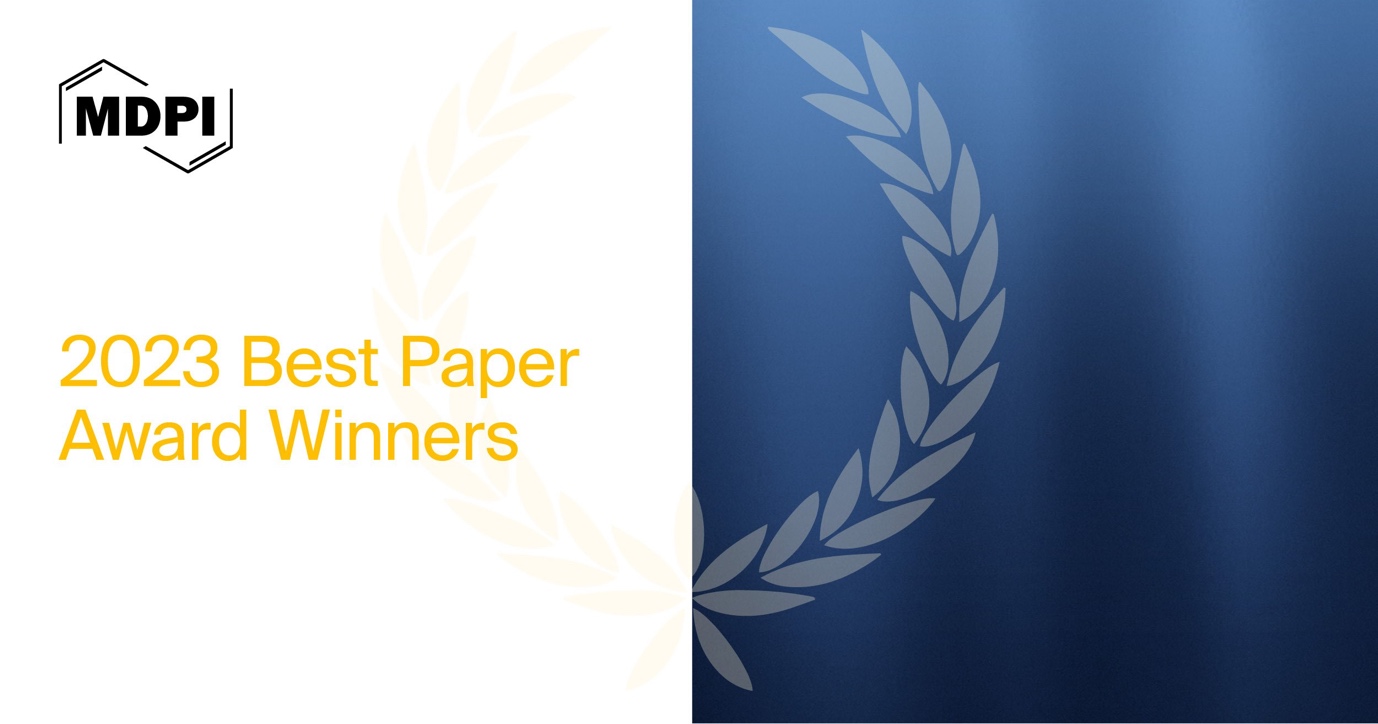
MDPI’s Best Paper Awards—Award-Winning Papers in 2023 Announced
MDPI is committed to supporting and recognizing the academic community and is proud to announce the recipients of the 2023 Best Paper Awards, which recognize high-quality papers of significant scientific merit and impact. Each year, the editors of our journals carefully select papers that showcase outstanding scientific achievement.
This year, 115 Best Paper Awards were presented, chosen from 346 exceptional papers in a highly competitive selection process. Congratulations to the authors for their remarkable contributions!
To learn more about all the awardees and their research projects, visit the following pages:
- Biology and Life Sciences
- Business and Economics
- Chemistry and Materials Sciences
- Computer Sciences and Mathematics
- Engineering
- Environmental and Earth Sciences
- Medicine and Pharmacology
- Public Health and Healthcare
- Social Sciences, Arts and Humanities
- Physical Sciences
About MDPI Awards
MDPI regularly offers various awards to recognize researchers, particularly young scientists, and to promote communication within the scientific community. These awards exist to inspire and acknowledge talented scientists who have made significant contributions to advancing their fields.
To find out more MDPI awards, please click here.
“Our awards exist to inspire and acknowledge talented scientists”
Inside MDPI
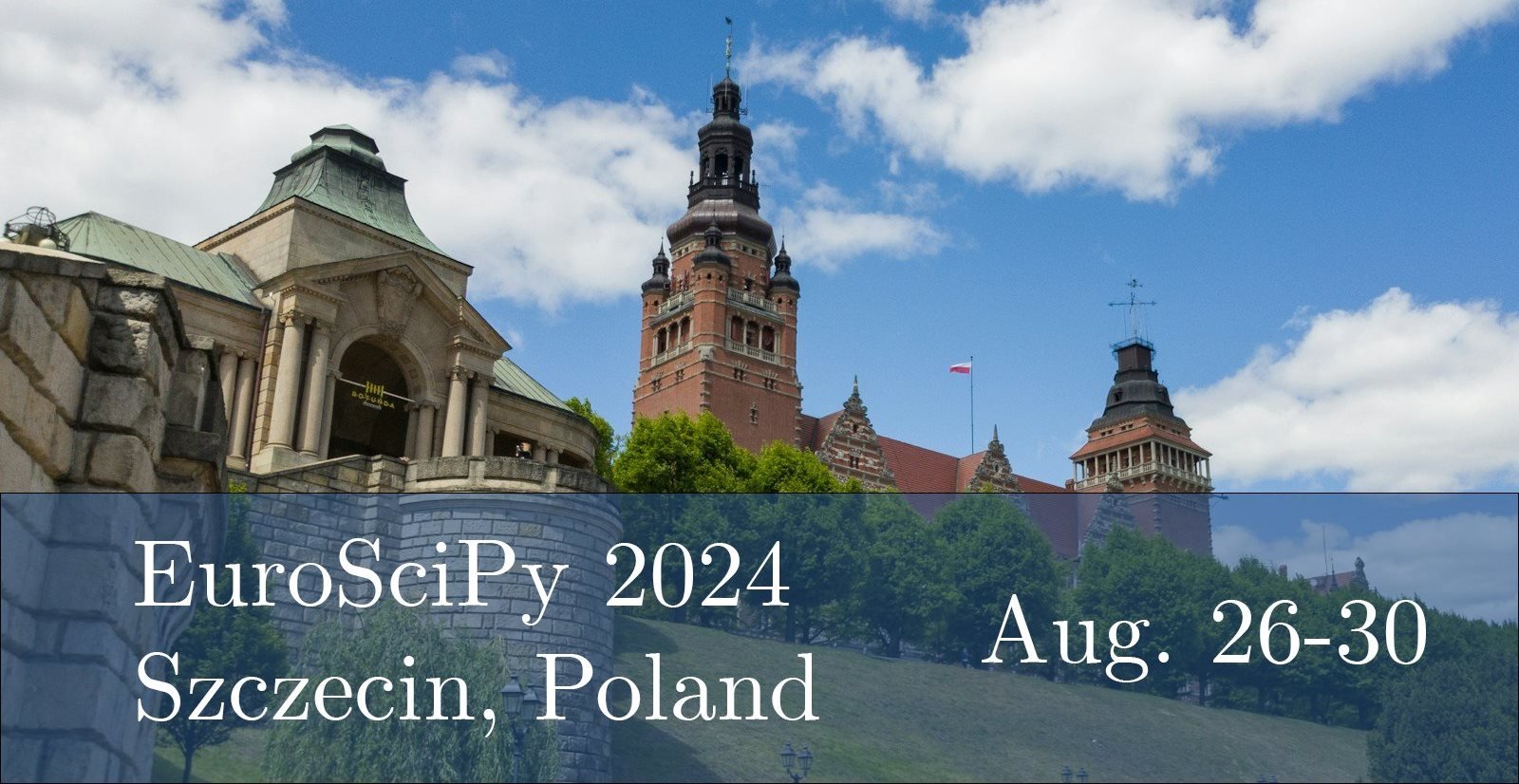
MDPI AI Team Presented at EuroSciPy 2024 in Poland
As part of the CEO Letter, I hold dear this ‘Inside MDPI’ section, where I have an opportunity to highlight various projects, teams and updates within our organization. As such, I’m happy to showcase the following presentations from members of MDPI’s Artificial Intelligence (AI) team, which were recently presented at the EuroSciPy 2024 (16th European Conference on Python in Science). This conference took place in Szczecin, Poland from 26–30 August.
“This event was a great opportunity to reinforce our commitment to innovation and excellence in publishing”
MDPI colleagues Frank Sauerburger (AI Tech Leader) and Daniele Raimondi (Senior Data Scientist) both presented at the conference. Frank discussed MDPI’s AI infrastructure, while Daniele showcased a new methodological approach we have been developing to track the journey of rejected academic manuscripts. This approach combines AI, data science and analytics to improve the identification of manuscripts and authors, enhancing our understanding of publishing dynamics.
This event was a great opportunity to reinforce our commitment to innovation and excellence in publishing. It also allowed us to contribute to the academic discussion on integrating AI and data science into scholarly communication.
From data analysis in Jupyter Notebooks to production applications: AI infrastructure at reasonable scale – Frank Sauerburger
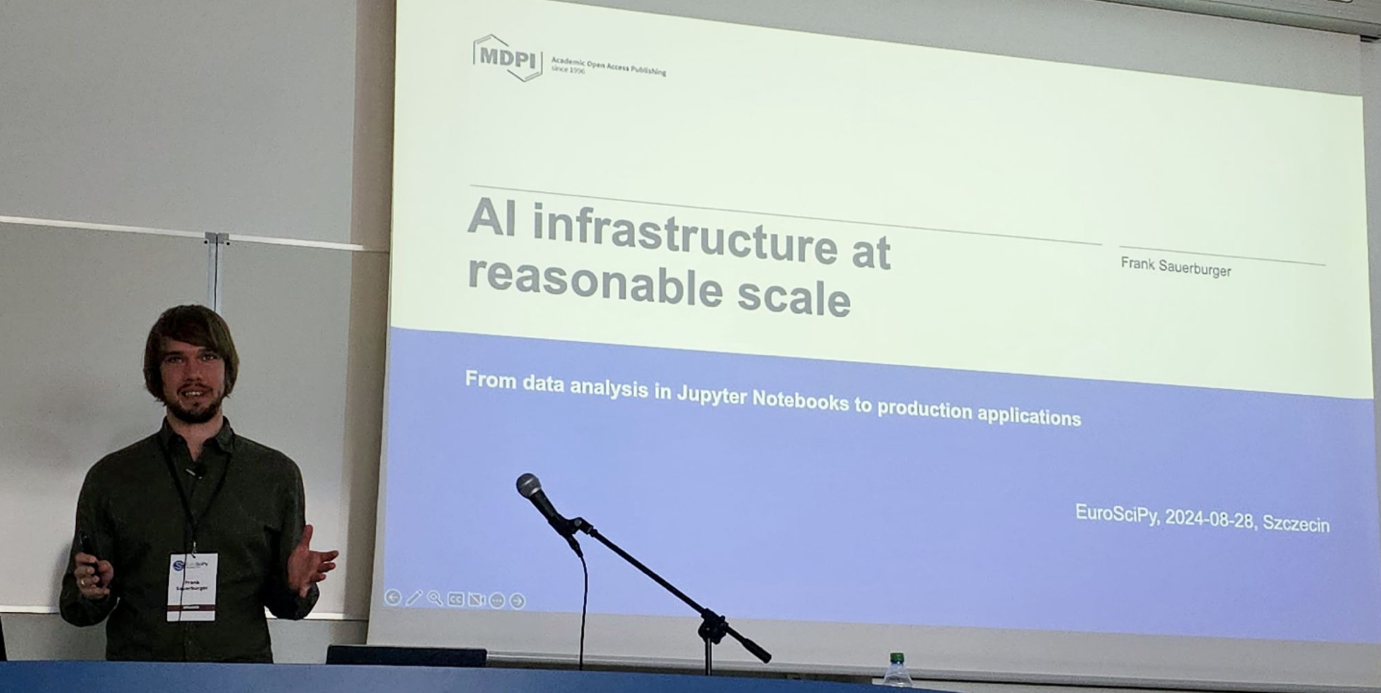
Frank’s presentation on MDPI’s AI infrastructure provided a chance to showcase the advanced technological frameworks that power our operations. Given the technical and academic focus of EuroSciPy, this talk demonstrated how MDPI’s AI capabilities are not only cutting-edge but also central to driving efficiency and innovation in scholarly publishing. Engaging with the EuroSciPy community helps position MDPI as a leader in applying AI within the publishing industry, fostering potential collaborations and attracting interest from top researchers.
A Qdrant and Specter2 framework for tracking resubmissions of rejected manuscripts in academia – Daniele Raimondi
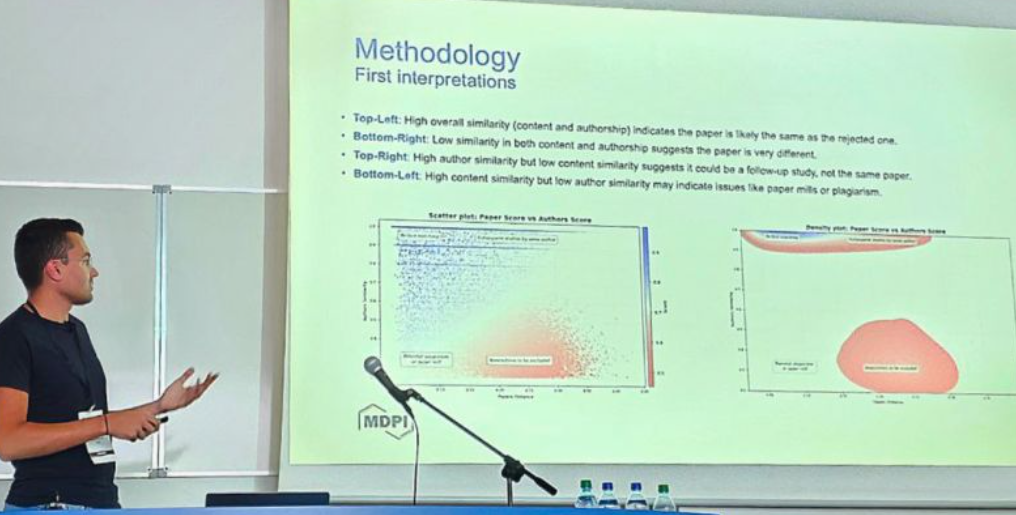
Daniele’s talk on the novel methodological approach that combines AI, Data Science, and Analytics was crucial in highlighting how MDPI is advancing the precision and effectiveness of manuscript and author identification. This approach is pivotal in enhancing our understanding of publishing dynamics and ensuring the quality and integrity of the academic content we manage. By presenting at EuroSciPy, we had the opportunity to engage with an audience deeply involved in scientific computing, gaining feedback and insights that could further refine our methodologies.
Thank you, Frank and Daniele, for representing MDPI so well!
I will share more about MDPI’s AI team and projects in upcoming CEO Letters, as we have a well-rounded AI and Data Team working on an exciting suite of AI products for MDPI and the scholarly community at large.
Coming Together for Science
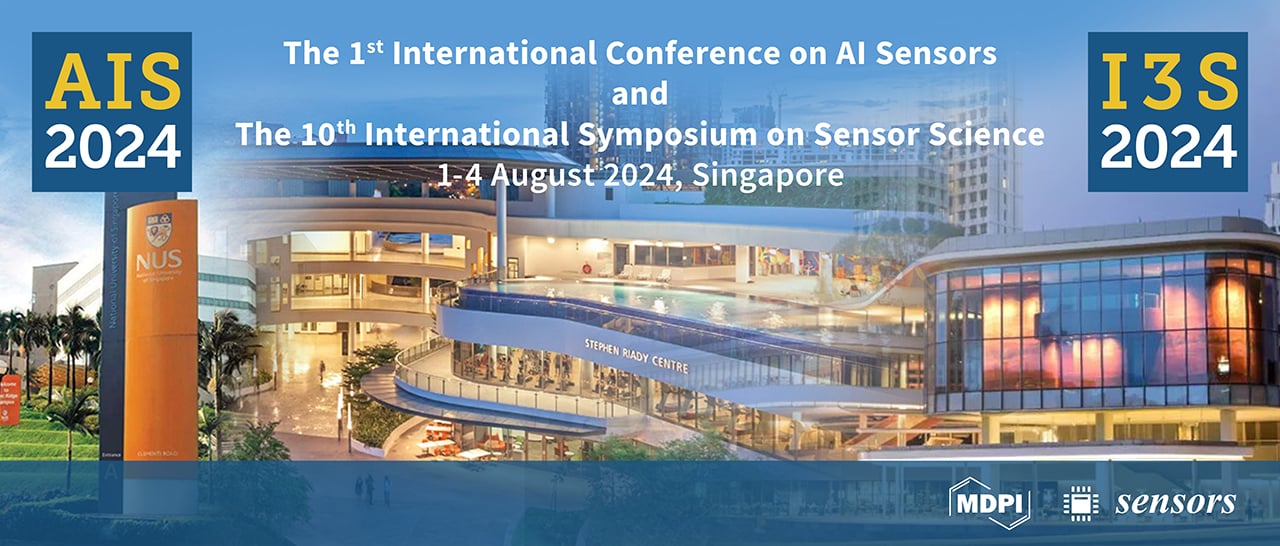
The 1st International Conference on AI Sensors & The 10th International Symposium on Sensor Science
I am pleased to share the success of our MDPI conference The 1st International Conference on Artificial Intelligence (AI) Sensors and the 10th International Symposium on Sensor Science in Singapore this past 1–4 August.
With nearly 400 attendees, the event brought together researchers and industry experts from China, Singapore, Japan, Korea, Taiwan, India and other countries to share their findings on the latest developments in sensors, sensing technology, artificial intelligence for sensing applications and AI-enhanced sensing systems.
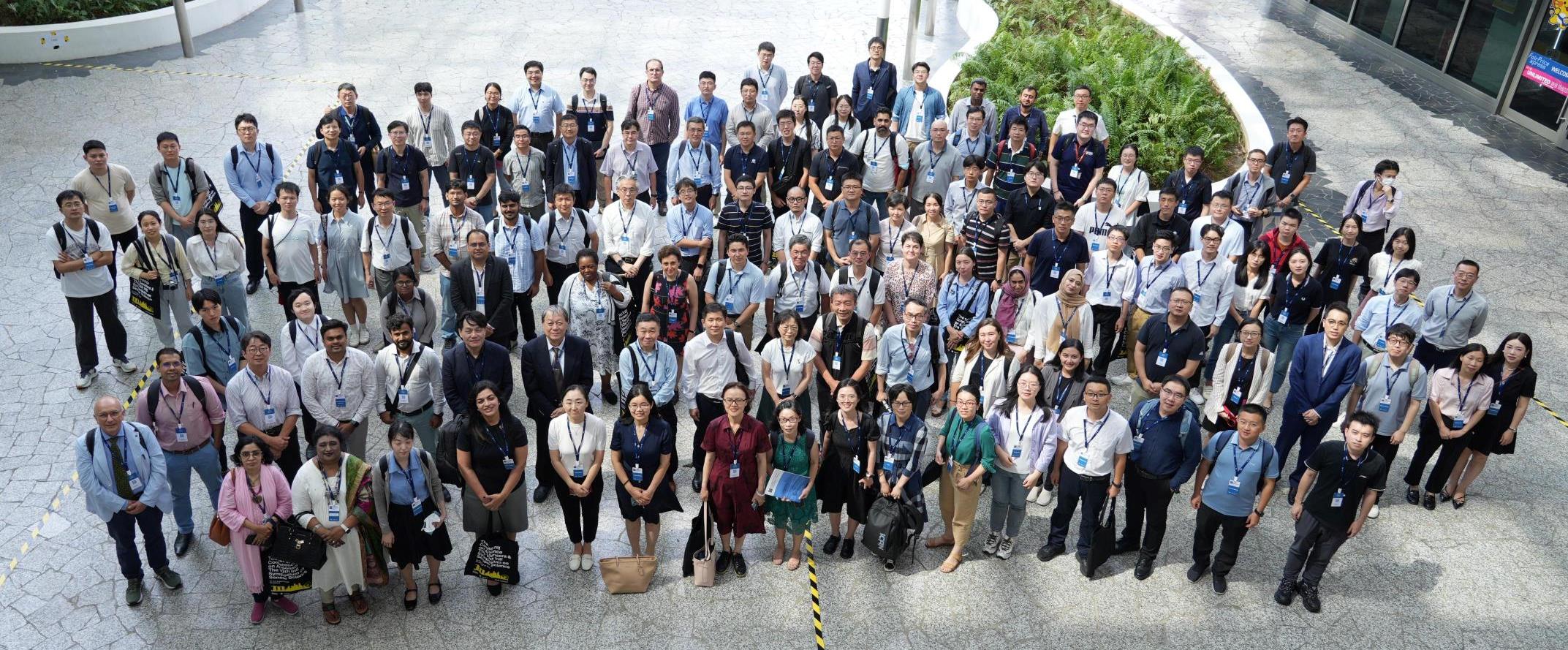
We accepted a total of 355 abstracts, featuring 772 authors from 28 countries. Over the course of the four-day event, 66 posters were displayed and 296 talks were delivered, including 4 plenary talks, 46 keynote speeches, 122 invited talks, and 124 selected oral presentations. View the event gallery here.
I am pleased to announce the winners of the four awards, including Best Presentation and Best Poster, recognizing the contributions of our participants during the conference.
Looking ahead, the 2nd International Conference on AI Sensors and Transducers is scheduled to take place from 29 July to 5 August, 2025, in Bangkok, Thailand.
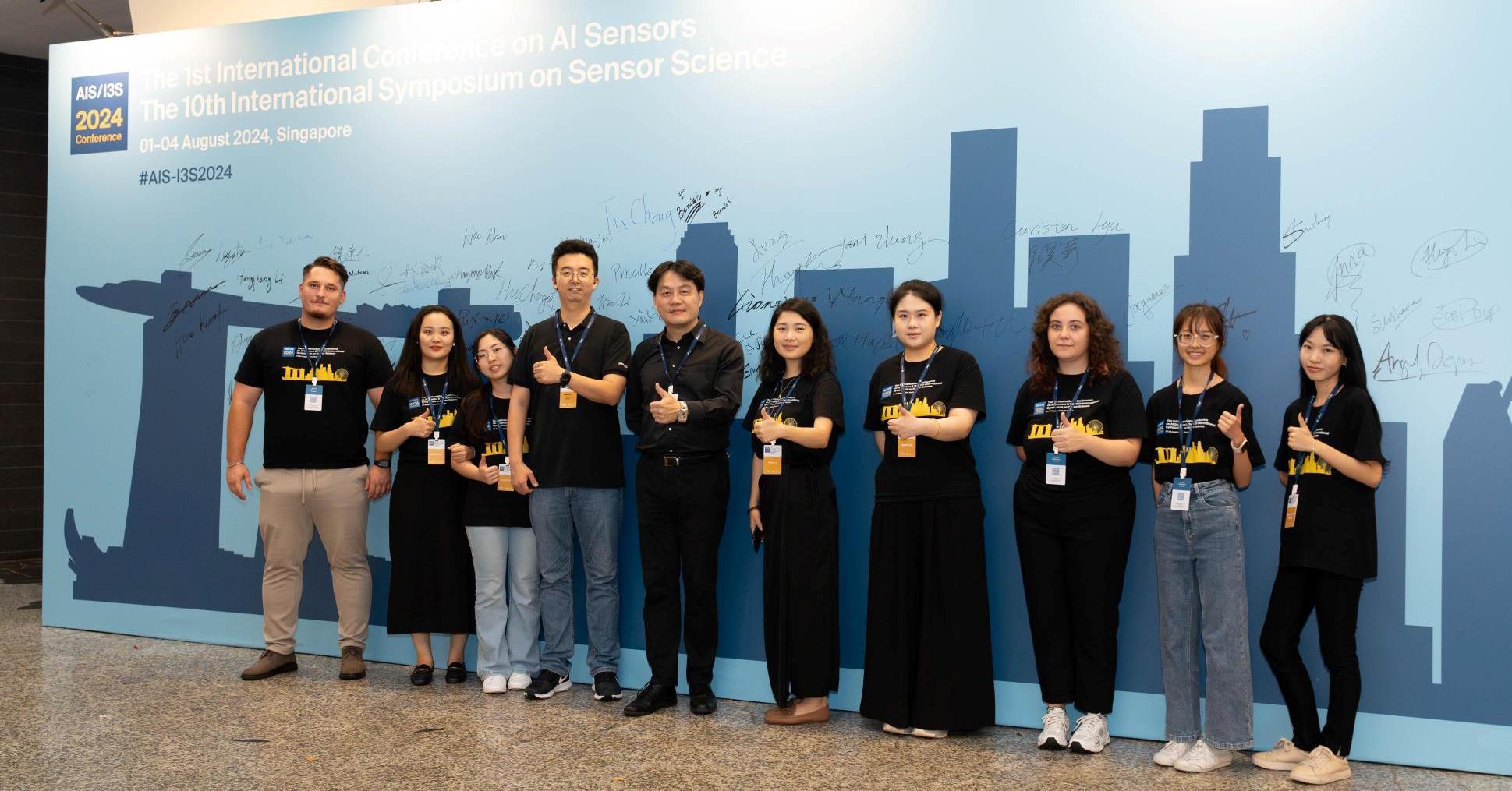
Thank you to our Conference team, including Ionut Spatar, Teodora Nicoleta Cremene, Ang Kai Lin, Benjamin Tay, Leong Jin Yue Esther, Wong Jolin, Judith Wu, Alethea Liu and Flora Li, who were involved in making this event a success. A big thank-you also goes to our local MDPI colleagues for their support: Yu Nwe Soe, Hen Chu Yang, Kwah Zhi En Watcharapong, Zephan Yang, Daphne Neo, Huimin Cheng, Nathan Li and Ting Yin.
Upcoming In-Person Event
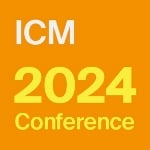
25–27 September, 2024
The 5th International Conference on Materials: Advances in Material Innovation
Location: Basel, Switzerland
ICM 2024 will unite experts to share insights on recent advancements in Materials Characterization, Processing and Manufacturing.
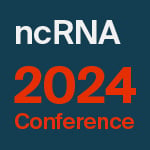
7–9 October, 2024
Non-coding RNA World 2024: Exploring Mechanisms, Designing Medicines
Location: Basel, Switzerland
ncRNA 2024 will explore the latest advances in the field, covering topics from basic biology to medical and technological applications.
Find more upcoming MDPI events here.
Closing Thoughts

The 2nd Sustainable Publishing Forum
In 2022, the International Association of Scientific, Technical and Medical Publishers (STM) outlined three goals to reflect the academic community’s shared aspirations: promoting Open Science, maintaining research integrity and fulfilling social responsibility. Open Science has evolved from the Open Access movement of the early 2000s to become a preferred model in academic publishing. Publishers and academic journals play a crucial role in ensuring research integrity, with efforts to prevent misconduct markedly on the increase now.
As the world faces sustainability challenges, the academic publishing industry is increasingly committed to contributing the achievement of the United Nations Sustainable Development Goals (SDGs). Many publishers are implementing strategies to support these objectives, including ours, which you can view here.
The 2nd MDPI Sustainable Publishing Forum provided a platform for global editors and publishers to discuss these themes, aiming to strengthen collaboration and advance the contributions that scientific publishing can make to academia and society.
“Open Science has evolved to become a preferred model in academic publishing”
The 2nd Sustainable Publishing Forum
We hosted MDPI’s 2nd Sustainable Publishing Forum in Beijing, China, on 15–16 August, attracting nearly 120 attendees from local and international publishers, university presses, scientific and technical journal associations, libraries and the Chinese Academy of Sciences. The event focused on promoting Open Science, maintaining research integrity, and fulfilling social responsibility.
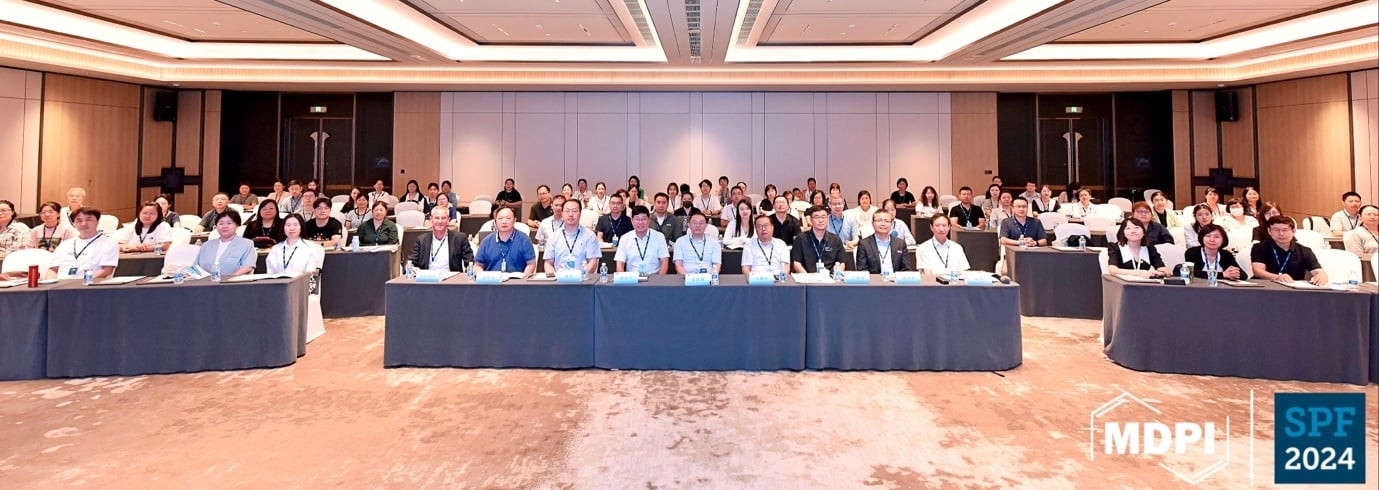
This was an excellent opportunity for us to share more with conference attendees about the approach of our research integrity team. Our Head of Publishing, Peter Roth, also participated, speaking on how to identify and avoid predatory publishers and about the principles that underpin ethical academic publishing.
I extend my thanks to all of our conference speakers, including Hylke Koers (STM Solutions), who presented on STM Trends 2028 and shared insights on the STM Integrity Hub, of which MDPI is a member.
Chief Executive Officer
MDPI AG
19 August 2024
MDPI’s 2023 Young Investigator Awards—Winners Announced
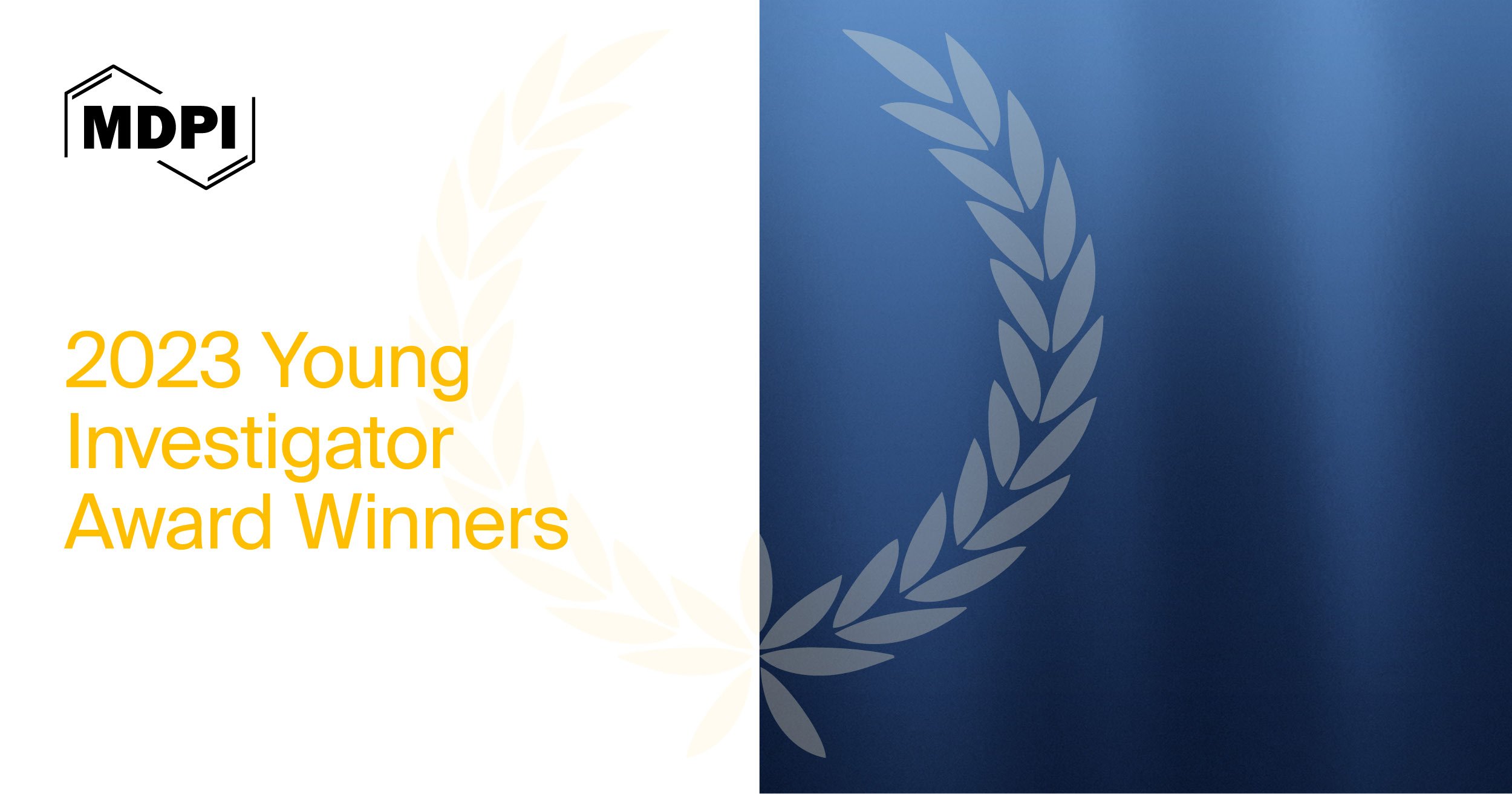
MDPI’s Young Investigator Awards recognize promising early career scientists, acknowledge their contributions, and foster collaboration within the scientific community. We are proud to announce the recipients for 2023, who were carefully selected by the journals’ esteemed Award Evaluation Committee.
We extend our heartfelt congratulations to the 79 winners of MDPI’s 2023 Young Investigator Awards for their excellent contributions in their research field. We look forward to seeing these rising stars continue to contribute to the advancement of science.
MDPI will continue to support and recognize the academic community. To explore details about the awardees by field, please visit the individual pages listed below:
Congratulations to all the winners for their exceptional contributions and dedication to advancing scientific research.
About MDPI Awards:
To support the academic community, particularly young researchers, and to enhance communication among scientists, MDPI journals regularly offer various awards to researchers in specific fields. These awards, serving as a source of inspiration and recognition, help to elevate the profiles of talented individuals who have made outstanding achievements and are making significant contributions to advancements in their respective fields.
To find out more about MDPI awards, please click here.
16 August 2024
MDPI’s Journal Cluster of Neurosciences
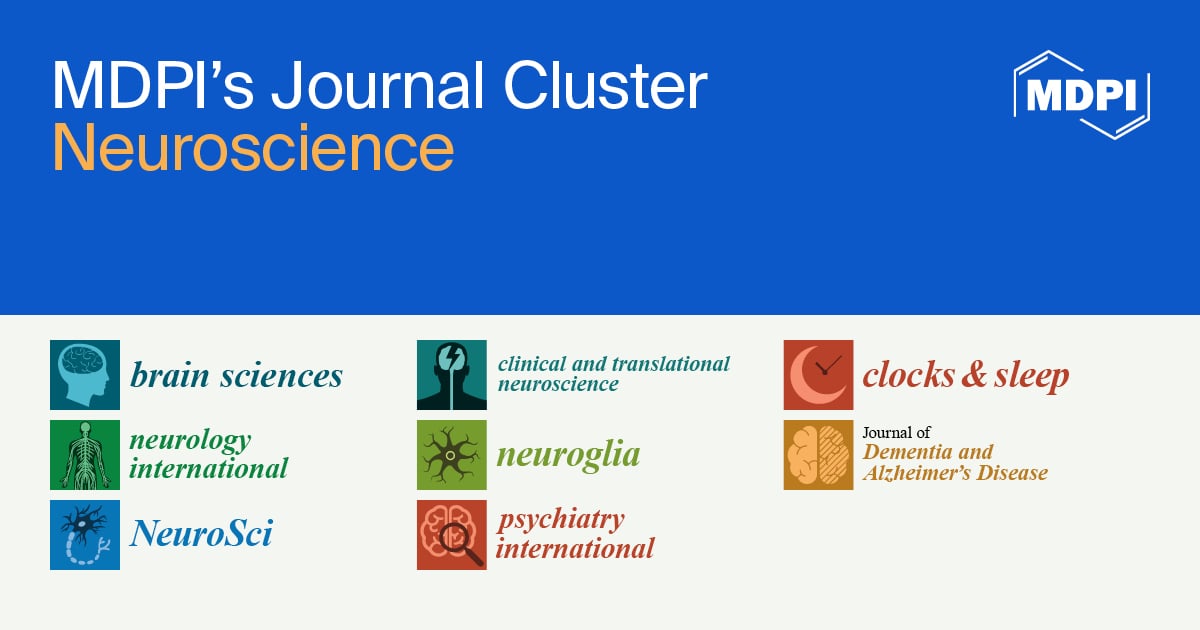
Neuroscience is a multidisciplinary field dedicated to understanding the complex and intricate workings of the nervous system. This field encompasses the study of the brain, spinal cord, and peripheral nerves, investigating their structure, function, development, and abnormalities. Neuroscientists integrate knowledge from biology, psychology, chemistry, physics, and computer science with the aim of understanding fundamental mechanisms underlying neural activities and how the brain processes information, regulates behavior, and enables cognitive functions such as memory, emotion, and decision-making.
MDPI’s Journal Cluster of Neurosciences has a mission to publish recent advances in this field that have profound implications for understanding the nervous system, treating neurological disorders and overall improving mental health. These journals will collaborate to offer the scientific community the most up-to-date research and discoveries within the field of neuroscience.
The eight participating journals include:
- Brain Sciences—focuses on cutting-edge research across the entire field of brain sciences, involving all branches of neuroscience. Brain Sciences is led by Editor-in-Chief Dr. Stephen D. Meriney (Department of Neuroscience, University of Pittsburgh, USA);
- Neurology International—focuses on the causes, mechanisms, diagnosis and treatment of neurological diseases, mainly in clinical neuroscience, cognitive neuroscience, affective neuroscience, neuroanatomy, and neurogenetics. Neurology International is led by Editor-in-Chief Dr. Junji Yamauchi (Laboratory of Molecular Neurology, Tokyo University of Pharmacy and Life Sciences, Japan);
- NeuroSci—focuses on molecular neuroscience, cellular neuroscience, cognitive repair, and brain functions, primarily in the branches of cellular neuroscience, molecular neuroscience, clinical neuroscience, and cognitive neuroscience. NeuroSci is led by Editor-in-Chief Dr. François Ichas (Institut des Maladies Neurodégénératives, CNRS et Université de Bordeaux, France);
- Clinical and Translational Neuroscience—translates or develops basic neuroscience research into novel clinical neuroscience applications and therapies, primarily in clinical neuroscience. Clinical and Translational Neuroscience is led by Editor-in-Chief Dr. Claudio Bassetti (Department of Neurology, Inselspital University Hospital of Bern, Bern, Switzerland);
- Neuroglia—focuses on research related to the numerous roles of glial cells in maintaining and repairing nervous system function, primarily in molecular neuroscience and clinical neuroscience. Neuroglia is led by Editor-in-Chief Dr. Jessica Filosa (Department of Physiology, Augusta University, USA);
- Psychiatry International—focuses on clinical psychiatry and biological psychiatry research with a focus on affective neuroscience, cognitive neuroscience and neuropsychology. Psychiatry International is led by Editor-in-Chief Dr. Paolo Girardi (Department of Dynamic and Clinical Psychology, and Health Studies, Sapienza University of Rome, Italy);
- Clocks & Sleep—publishes original research covering all aspects of biological rhythms and sleep in all organisms and focuses on genetic, molecular, biochemical, neurological, neuroendocrine, behavioral, physiological, cognitive, and epidemiological factors and brain imaging, dreams, modeling, shiftwork, and clinical approaches and/or topics. Clocks & Sleep is led by Editors-in-Chief Prof. Dr. Christian Cajochen (Psychiatric Hospital of the University of Basel, Centre for Chronobiology, Switzerland) and Prof. Dr. Paul Franken (Center for Integrative Genomics, University of Lausanne, Switzerland);
- Journal of Dementia and Alzheimer's Disease—focuses on all types of dementia, with an emphasis on Alzheimer’s disease and studies on memory. Biological studies that focus on molecular and cellular aspects of disease onset and progression as well as clinical studies are welcome. Journal of Dementia and Alzheimer's Disease is led by Editor-in-Chief Prof. Magda Tsolaki (1st Department of Neurology, Aristotle University of Thessaloniki, Greece).
|
|
Launch Year |
Impact Factor (2023) |
CiteScore (2023) |
First Decision (Median Days) |
Acceptance to Publication (Median Days) |
APC (CHF) |
|
2011 |
2.7 |
4.8 |
12.9 |
2.5 |
2200 |
|
|
2009 |
3.2 |
3.7 |
22.1 |
3.6 |
1600 |
|
|
2020 |
1.6 |
/ |
22.8 |
5.3 |
1000 |
|
|
2017 |
/ |
/ |
36.7 |
4 |
1000 |
|
|
2018 |
/ |
/ |
24.6 |
6 |
1000 |
|
|
2020 |
1.2 |
1.9 |
34 |
5.8 |
1000 |
|
|
2019 |
2.1 |
4.4 |
27.3 |
4.6 |
1600 |
|
|
2023 |
/ |
/ |
16 |
5.8 |
1000 |
MDPI’s Mission and Values
As a pioneer of academic open access publishing, MDPI has been serving the scientific community since 1996. Our aim is to foster scientific exchange in all forms, across all disciplines. MDPI's guidelines for disseminating open science are based on the following values and guiding principles:
- Open Access—All of our content is published in open access and distributed under a Creative Commons License, providing free access to science and the latest research, allowing articles to be freely shared and content to be re-used with proper attribution;
- Timeliness and Efficiency—Publishing the latest research through thorough editorial work, ensuring a first decision is provided to authors in under 32 days and papers are published within 7–10 days upon acceptance;
- Simplicity—Offering user-friendly tools and services in one place to enhance the efficiency of our editorial process;
- High-Quality Service—Supporting scholars and their work by providing a range of options such as journal publication at mdpi.com, early publication at preprints.org, and conferences on sciforum.net to make a positive impact on research;
- Flexibility—Adapting and developing new tools and services to meet the changing needs of the research community, driven by feedback from authors, editors, and readers;
- Rooted in Sustainability—Ensuring long-term preservation of published papers and supporting the future of science through partnerships, sponsorships, and awards.
By adhering to these values and principles, MDPI remains committed to advancing scientific knowledge and promoting open science practices.
Selected Topics:
- “Applications of Biomedical Technology and Molecular Biological Approach in Brain Diseases”;
- “Diagnosis and Management of Acute Ischemic Stroke”;
- “Translational Advances in Neurodegenerative Dementias”.
Selected Articles:
Brain Sciences
“Artificial Intelligence Frameworks to Detect and Investigate the Pathophysiology of Spaceflight Associated Neuro-Ocular Syndrome (SANS)”
Neurology International
“Long COVID, the Brain, Nerves, and Cognitive Function”
NeuroSci
“The Probable Infectious Origin of Multiple Sclerosis”
Clinical and Translational Neuroscience
“The Psychoneurobiology of Insomnia: Hyperarousal and REM Sleep Instability”
Neuroglia
“Glucose Transporter-2 Regulation of Male versus Female Hypothalamic Astrocyte MAPK Expression and Activation: Impact of Glucose”
Psychiatry International
“Mental Health Risk Factors Related to COVID-19 among Canadian Public Safety Professionals”
Clocks & Sleep
“Relationship between the Biological Clock and Inflammatory Bowel Disease”
Journal of Dementia and Alzheimer's Disease
“Aging, Age-Related Diseases, and the Zebrafish Model”
7 August 2024
MDPI Insights: The CEO's Letter #14 - New Headquarters, Marketing, Poland

Welcome to the MDPI Insights: The CEO's Letter.
In these monthly letters, I will showcase two key aspects of our work at MDPI: our commitment to empowering researchers and our determination to facilitating open scientific exchange.
Opening Thoughts
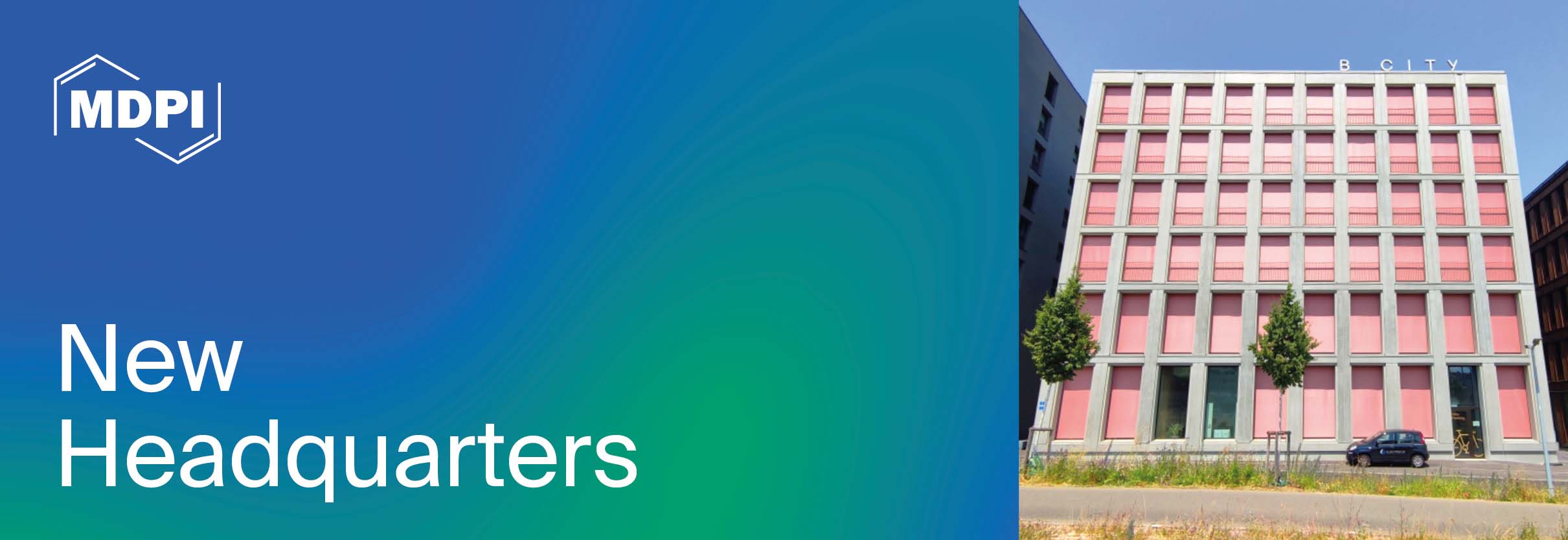
MDPI Moves to New Headquarters in Basel, Switzerland

I am excited to share that MDPI has moved to a new state-of-the-art office space in Basel, Switzerland. This move consolidates our operations by bringing together our two previously separated Basel offices into one central location.
We are always growing our talent pool and encourage you to view our Careers Page for the positions available in Basel and across our offices.
New Address: Grosspeteranlage 5, CH-4052 Basel, Switzerland
Effective Date: 1 July 2024
This new chapter in our company’s journey is designed to continue our mission of positioning MDPI as a leader in Open Access (OA) publishing, highlighting our commitment to making scholarly research accessible to everyone.

Boasting modern amenities, improved meeting and event spaces designed to support our growing needs, the new location provides a more collaborative and efficient working environment for our employees. The location offers convenient accessibility to public transportation and is situated near the Basel SBB railway station, with a variety of nearby services and amenities.
In fact, I can see the trains right outside of my window as I write these lines!
This move marks an exciting milestone in MDPI’s development, and I am confident that the new headquarters will serve as an inspiring and productive space for everyone. We also very much look forward to welcoming visitors here. You can read more about MDPI's history here.
“This new chapter continues our mission of positioning MDPI as a leader in OA publishing”
For Those New to MDPI
A pioneer in scholarly, Open Access publishing, MDPI has supported academic communities since 1996. MDPI is leading the transition to Open Science by making a greater proportion of the research conducted worldwide free and accessible to everyone. To date, over 3.5 million researchers have entrusted MDPI with publishing their scientific discoveries. MDPI’s editorial process is bolstered by a network of dedicated reviewers, a team of 6,000 professional, well-trained staff members, and an in-house article submission platform designed to ensure efficient processes within its 440 fully Open Access titles. MDPI supports more than 800 academic institutions worldwide, helping them adhere to national mandates while facilitating authors’ publication in fully compliant (CC BY) Open Access journals.
Impactful Research
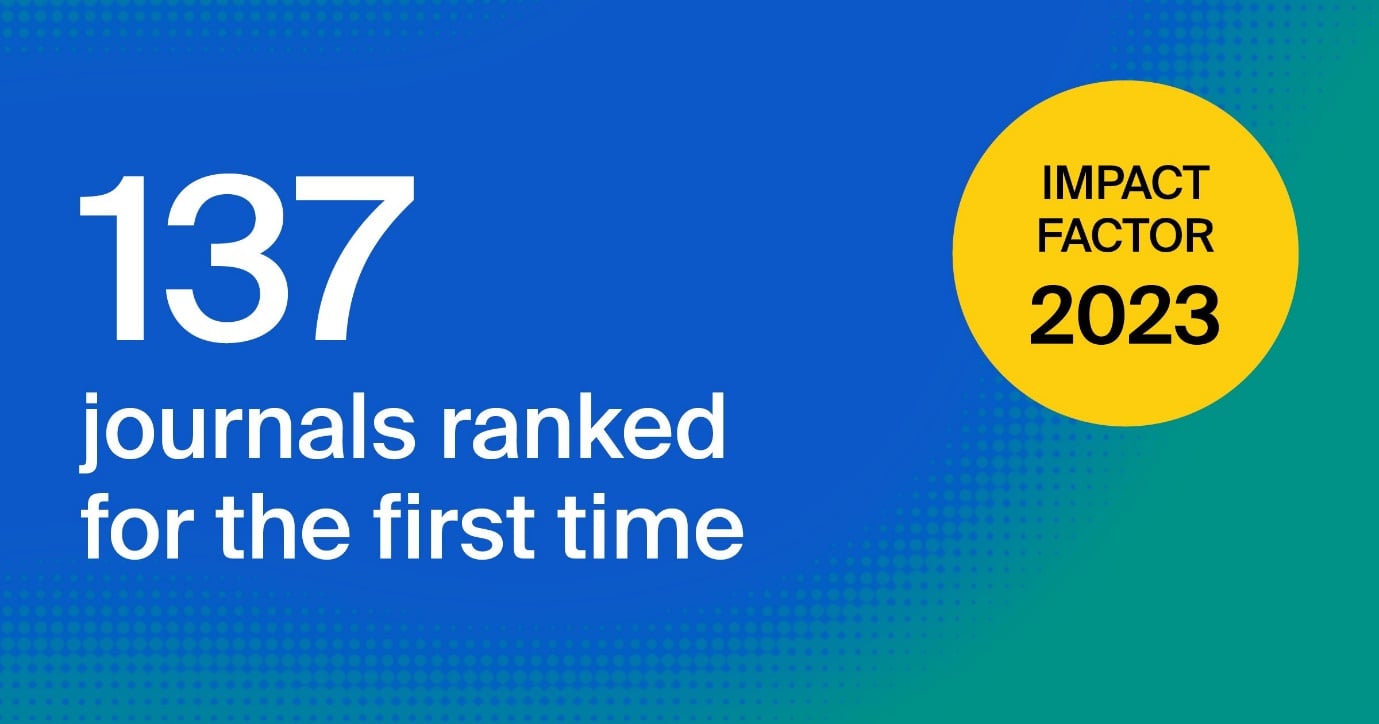
New and Emerging MDPI Journals Making an Immediate Impact
Unpacking some of the Impact Factor updates from the June CEO Letter, I wanted to dive a little deeper into the 137 MDPI journals which received Impact Factor for the first time.
Academic authors highly value efficient publishing processes, robust editorial support, and the opportunity to publish in high-impact journals. We are proud that our newly launched journals typically achieve coverage in the Emerging Sources Citation Index (ESCI) of the Web of Science within just a few years, with a median time of only three years from release to inclusion.
As part of our commitment to advancing academic research and providing high-quality OA publishing, we actively seek new research areas to expand our portfolio of journals. We have a proven track record of successfully establishing new journals.
Our dedicated teams excel in fostering dynamic editorial boards and working closely with Editors-in-Chief (EiC) to define the precise scope and focus of each new journal. Our expertise extends to collaborating with indexing services, ensuring that our journals comply with best practices and are indexed promptly in all relevant databases.
Emerging Titles Ranked for the First Time
Our commitment to excellence is reflected in the annual impact metrics released this past June. The latest edition of the Journal Citation Reports (JCR) showcases the integration of journals from the ESCI in the new unified category rankings, providing a simplified and more complete view of all journals within each subject category, including newly established titles.
Out of 137 new and developing MDPI journals ranked in the 2024 release, 79 are in the top half (Q1 or Q2) of their categories. Here is a breakdown of the number of MDPI’s ESCI-indexed journals by quartile in the JCR:
| Quartile | No. of journals |
| Q1 | 17 (12.4%) |
| Q2 | 62 (45.3%) |
| Q3 | 43 (31.4%) |
| Q4 | 15 (10.9%) |
| Not ranked (humanities-related journals) | 2 |
These rankings highlight our success in rapidly establishing high-impact new journals. Among those that made it directly into the top 25% of their category are the International Journal of Neonatal Screening, Journal of Xenobiotics, Polysaccharides, Smart Cities, and thirteen other journals.
You can browse MDPI journals by Indexing. Simply visit our Journals page and select from the list of Indexing bodies in the top left-hand corner.
Inside MDPI

MDPI Corporate Marketing Strategy and Team Meeting 2024
In July, I hosted the annual Corporate Marketing strategy and team-building activity with 15 of our team members.
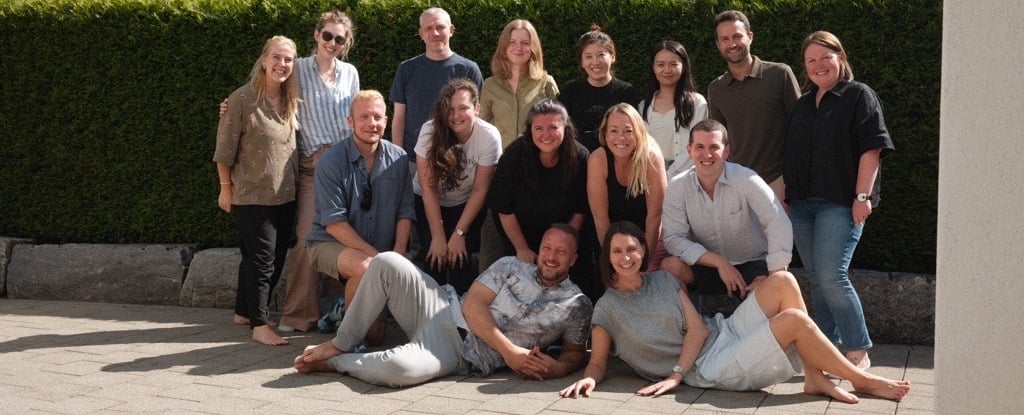
The aim was to align the Corporate Marketing strategy with MDPI's goal of becoming the world's most trusted OA publisher. While we provide a high-level publishing experience for our authors, as seen from our surveys, we need to keep building on our transparent and open communication to foster trust within the scholarly community and continue enhancing our reputation.
The Corporate Marketing team plays an important role as the mouthpiece for all our major activities within MDPI, especially those that model what it means to be a trusted partner. The purpose of the strategy meeting was to develop a feeling of trust in one another and an understanding of how to inspire trust in the stakeholders with whom we interact.
“We need to keep building on our transparent and open communication to foster trust within the scholarly community”

We conducted a set of activities to facilitate that sense of mutual trust and trustworthiness. Examples of some activities we worked on during this strategy-building event include:
- Exploring what trust means
- ‘Letter to self’
- ‘The brand I most trust’
- Most Trusted Academic Publisher
- ‘The brand I would like MDPI to become’
- ‘The 2029 MDPI Annual Report’
- Voice of Customer and Share of Voice – survey/data update on MDPI Brand Experience and Brand Perception
- Integrate Trust-Based Objective into Marketing Plan
- ‘Becoming the MDPI experience’
- ‘Trusting the next steps’
While two days is not enough to finalize a marketing strategy, it is sufficient to get everyone who attended into the mindset of the direction in which we are working. From here, we will develop a program with next steps on main projects, update communications, and collaborate with team leads to incorporate this approach into our work going forward.
As a marketing team, we can communicate our messages, but trust has to be built at every touchpoint in the stakeholder journey. Just talking about it isn’t enough. We need to be about it. That’s a role each of us plays, from editorial to IT, from marketing to HR. We must build trust from the inside out. It starts with each manager and resonates out via every team member.
As a company, our goal is to give all stakeholders with whom we interact – whether internal or external – the experience of working with an organization it can trust.
Coming Together for Science
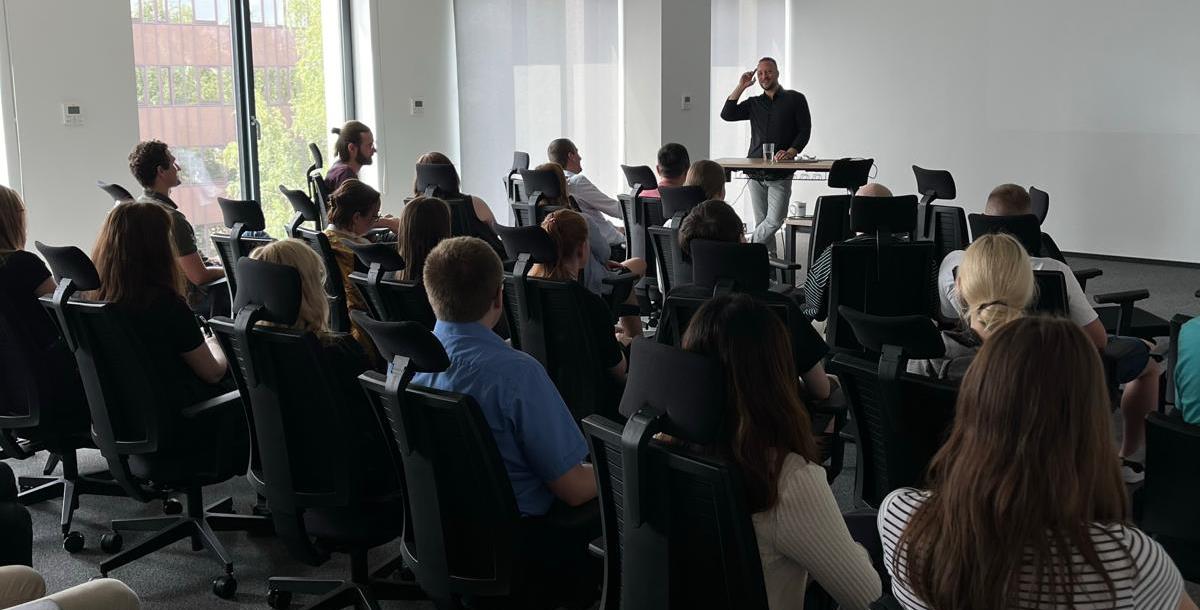
MDPI in Poland: Krakow Office
In July, I had the pleasure of visiting our Krakow office, following my recent trip to Warsaw to meet with the Polish Ministry of Science and Higher Education.

During these visits, I prioritized meeting with our Office Manager, Editorial Director, Group Leads, and members from various teams, including editorial, production, marketing, and journal relationship specialists, to understand their roles and current challenges. Instead of a formal presentation, I opted for an open discussion, sharing updates from headquarters to engage with colleagues in a more personal way.
Our Krakow office has many things to be proud of, including a large number of PhD colleagues (over a third of its staff holds a PhD degree). Krakow provides an opportunity for expanding beyond the 100 colleagues we currently have, by adding new hires in departments including editorial, production and marketing, among others.
About our Krakow office
- Opened in 2020
- 99 staff members as at 1 August 2024
- Main Departments include Editorial, Production, English Department, JRS, PR
Our Krakow office participates in international conferences, conducts author trainings and scholar visits, and engages in local market outreach. The office is also a member of the Polish Chamber of Commerce for High Technology (IZTECH) and is working on expanding its local engagement.
Krakow is the second-largest city in Poland, with a population of about 800,000. It also has a large student population of around 128,000, with seven universities. This means that roughly one in every eight residents is a student.
Poland and MDPI

Poland is a crucial market for MDPI. From 2020 to June 2024, Poland ranked 7th in submissions and 5th in publications for MDPI research articles. As at 31 July 2024, Poland ranks 7th in total MDPI publications, with approximately 70,000 research papers.
Between 2020 and June 2024, 61,500 authors from Poland published with MDPI. As at 30 June 2024, there are 1,205 active Editorial Board Members (EBMs) from Poland, with 661 EBMs (55% of the total) having an H-index over 25.
We also have four Editors-in-Chief (EiC) from Poland leading our journals: Coatings, Venereology, Advances in Respiratory Medicine, and Limnological Review, along with six Section EiC.
In 2023, we received approximately 21,000 submissions from Polish-affiliated authors, of which 12,032 were published.
“Poland is a crucial market for MDPI”
Meeting with Ministry of Education

On 22 July, we visited Warsaw to meet with the Polish Ministry of Science and Higher Education.
We were pleased to learn that they are strong supporters of the OA publishing model and value MDPI’s approach to the peer-review process, including our high ethical standards for quality control.
In 2023 Polish authors predominantly published their papers in OA, with MDPI holding the largest market share in OA publications within the country.
Our commitment to collaborating with Polish institutions is evident through our 33 Institutional Open Access Program (IOAP) agreements with prestigious institutions such as the University of Warsaw, the University of Wroclaw, the Jagiellonian University, and Gdańsk University of Technology. Through IOAP discounts, a healthy waiver rate, and our peer-review voucher system, we provide the Polish scholarly community with significant savings in OA publishing. The Minister greatly appreciated these efforts and our commitment to offsetting some of the APC costs.
We discussed industry concerns about the threat of papermills and presented the preventive measures MDPI has in place to mitigate this risk and uphold high ethical standards. We informed them of our commitment to combating papermills, including our involvement with United2Act and the STM Research Integrity Hub, as well as our efforts to expand our research integrity team and explore proactive measures.
Closing Thoughts

MDPI Thought Leadership Op-ed on Open Access is Now Live on Politico
I am pleased to share that our thought leadership Op-ed piece on Open Access (OA) is now live on Politico. This is a nice push for continued influence and support of OA among policymakers and industry leaders.
Why Politico?
Politico's reputation as a highly credible and influential news platform makes it an important venue to reach key opinion leaders (KOL) from academia, policymakers, and thought leaders from many industries. This visibility helps promote the OA philosophy.
Open Access: A Moral Imperative for Progress
In this piece, I discuss the necessity of making scientific research freely available to all. I argue that publicly funded research should be publicly accessible, highlighting how OA democratizes scientific knowledge, accelerates research availability, and fosters collaboration.
“Open Access is a fundamental right for all citizens”
Democratizing scientific communication
The impulse to democratize scientific communication is nothing new. OA may seem like a recent innovation, but its principles have historical roots traceable to Europe in the 15th century. Just as the printing revolution accelerated the dissemination of new ideas, OA publishing unlocks new scientific insights that would otherwise only be accessible to a few.
Benefits for scholars: amplifying impact through Open Access
Authors publishing in an OA journal can expect more citations of their work, increasing its potential impact. Research findings that are freely available are more likely to be cited than those hidden behind a paywall. Freedom of access greatly increases the potential audience for each paper, fostering a sense of community among researchers worldwide. Heightened visibility can attract prospective collaborators and employers for young scientists. At MDPI, we believe that all these factors can only accelerate the advance of science. Additionally, authors retain copyright in their work instead of signing it away, permitting broader dissemination under Creative Commons licenses and increasing its capacity for impact.
The moral imperative
OA is not just a matter of scientific policy; it is a fundamental right for all citizens and a prerequisite for a brighter, more informed future. Publicly funded research should be a top priority, and I am pleased to see policy moving in this direction. Our capacity to generate transformative scientific insights has to be democratized. The question today is no longer whether we can afford to embrace OA; rather, it is whether we can afford not to.
Chief Executive Officer
MDPI AG
2 August 2024
MDPI Romania Author Training Sessions in May
In May, MDPI Romania held three author training sessions – one endorsing an external event and two stand-alone sessions.
The National Session of Scientific Student Communications took place at Technical University Cluj on 17 and 18 May 2024. MDPI Romania sponsored this event and contributed an author training session on the production of research papers and case study analyses. JRS Norbert Kiss gave a presentation called The World of Open Access to explain different open access publishing models and the benefits of open access publishing. His presentation highlighted the impact of open access publishing on scientific progress and innovation.
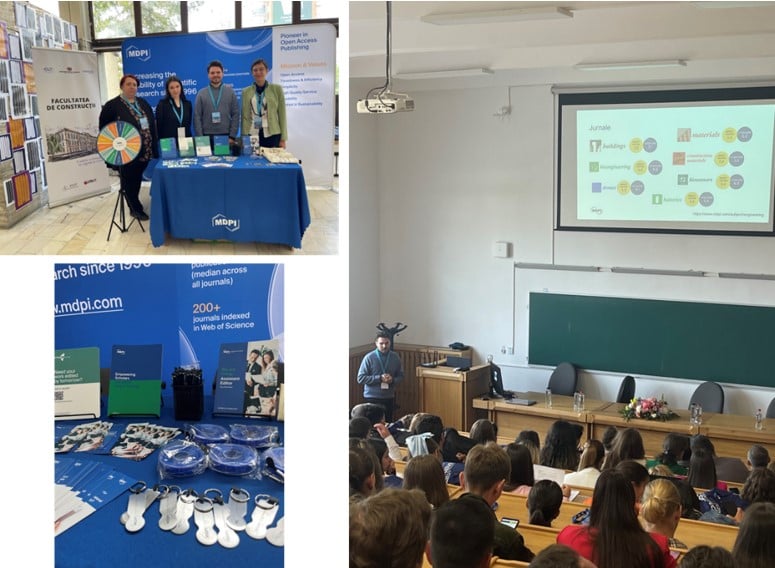
On 29 May 2024, MDPI Romania hosted an author training session for Ph.D. students, early career researchers, and professors at the Carol Davila University of Medicine and Pharmacy. In collaboration with Prof. Andreea Arsene, JRS Ioana Paunescu prepared two presentations: The Steps of the Publishing Process and Elaboration of a Peer Review Report. In her first presentation, she delved into MDPI’s history and mission, MDPI’s editorial process, and MDPI journals of various scopes that are accepting submissions. Her second presentation outlined the types of peer review, the contents of a peer review report by an MDPI reviewer, and the responsibilities of an MDPI reviewer.
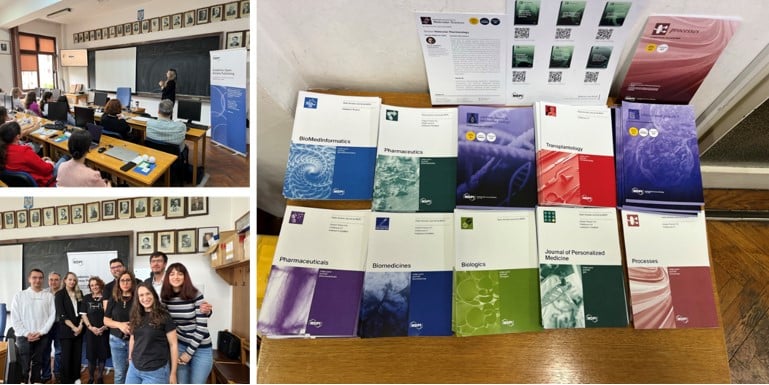
MDPI Romania also hosted an author training session at the Iasi University of Life Sciences on 29 May 2024. JRSs Laurentiu Preda and Cosmin Artan gave four presentations: Efficient Writing of an ISI-Indexed Scientific Article, Benefits of Publishing in the Open Access Model, Various Methods of Open Access Publishing, and MDPI Guide for the Article Review Process. The first three presentations offered guidance on how to improve academic writing, the fourth focused on how to write peer review reports. A highly interactive discussion followed the presentations, during which the JRSs provided extensive answers to attendees’ questions.
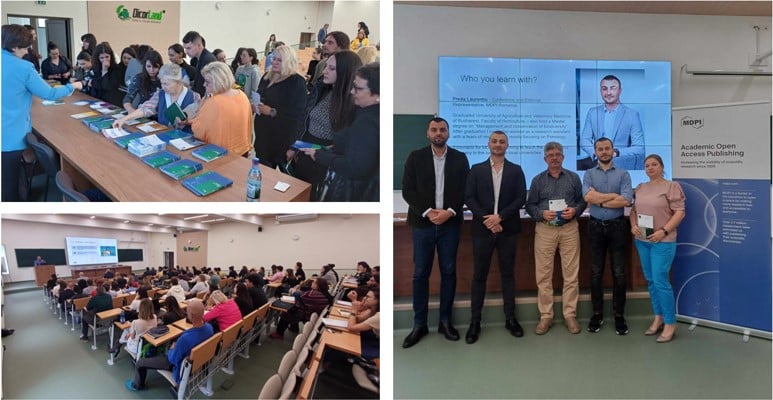
MDPI is grateful for all the attendees, speakers, and organizers involved in these events. Through their enthusiasm and dedication, these events were great successes.
26 July 2024
Brain Sciences | Interview with Prof. Dr. Pierluigi Zoccolotti, Session Chair and Keynote Speaker of the 4th International Electronic Conference on Brain Sciences
We had the pleasure of talking with Prof. Dr. Pierluigi Zoccolotti, from Sapienza University of Rome, Italy. In this interview, we delve into Prof. Dr. Zoccolotti’s research on spatial neglect and his recent work at the Tuscany Rehabilitation Clinic. In his keynote address at IECBS 2024, he will explore the latest advancements in the management of spatial neglect, with a focus on allocentric neglect. Prof. Dr. Zoccolotti will also examine how these insights can improve our understanding of patient daily activities and therapeutic interventions.
Join us at the 4th International Electronic Conference on Brain Sciences to uncover valuable perspectives on the evolving field of brain sciences.
For more information, please visit the following website: https://sciforum.net/event/iecbs2024.
The following is an interview with Prof. Dr. Pierluigi Zoccolotti:
1. Could you introduce your current research direction and provide an update on your progress?
In the last twenty years, I have been a “bifront gianus”, dividing myself into research on acquired neuropsychological disorders and learning disabilities. Here, I will present research on spatial neglect, a key symptom after unilateral brain injuries.
2. Have you encountered any challenges in your research? How did you overcome them? Could you share your experience?
I recently started working at the Tuscany Rehabilitation Clinic in Montevarchi. This required re-establishing diagnostic and research procedures, a process which has now been nearly completed. For example, we set a new procedure with visual evoked potential to establish the integrity of visual fields in patients with spatial neglect.
3. Looking ahead, what do you believe will be the hot topics in the field of brain science research in the next few years? Please share the topics and the reason for it.
The development of science usually defeats any attempt to predict its new critical achievements. At any rate, the impressive advances in neuroimaging (and neurostimulation) should allow a closer look at the relationship between neuropsychological symptoms and brain circuits. This does not bypass the need for theoretical models. On the contrary, crucial advancements may come from the interplay between cognitive models and behavioral and imaging data. Space representation and procedural learning may be exemplary topics in this perspective. Furthermore, new, and ever more promising forms of interventions for neuropsychological symptoms are being developed and may change our traditional view of neuropsychology as mostly focusing on diagnostic evaluations.
4. What inspired you to choose this topic for your talk at IECBS 2024?
Spatial neglect is a symptom with widespread influence on the patient’s life. In recent years, there have been several studies on therapeutic interventions. In the live session on “Update on spatial neglect”, we will take stock of what we now know about the effectiveness of these treatments and more generally the management of these patients. In my presentation, I will focus on allocentric neglect, a particular form of disturbance which is still poorly understood.
5. What can the audience expect to gain from your presentation at IECBS 2024? What key insights or breakthroughs will attendees be able to take away from your discussion?
Information on managing and treating spatial neglect should prove of interest to both researchers and clinical neuropsychologists. In my talk, I will examine possible interpretations of allocentric neglect. Furthermore, I will describe how it may contribute to the impact on the patient’s daily activities.
6. On a lighthearted note, what catchy phrase or hashtag would you create to summarize the essence of your talk at IECBS 2024 in a few words?
We know several forms of dissociation within spatial neglect, pointing to multiple space representations. Maybe it is time to move from a focus on dissociations to understanding how multiple processes interact in shaping human behavior.
10 July 2024
MDPI's Newly Launched Journals in June 2024
 Five new journals covering multiple subjects have launched their inaugural issue in June 2024. We are excited to be able to share with you the newest research rooted in the value of open access.
Five new journals covering multiple subjects have launched their inaugural issue in June 2024. We are excited to be able to share with you the newest research rooted in the value of open access.
We would like to express our deepest appreciation to all the Editorial Board Members and each journal will ensure its high-quality output using excellent editorial and rigorous peer review processes, to ensure that the articles achieve high impact and visibility.
Please feel free to browse and discover more about the new journals below.
|
Journal |
Founding Editor-in-Chief |
Journal Topics (Selected) |
 |
Prof. Dr. Marco Ranucci, IRCCS Policlinico San Donato, Italy |
anaesthetic medications; blood and fluid management; pain management; critical care; critical illness | view journal scope | submit an article |
 |
Dr. Giovanni E. Cacciamani, University of Southern California, USA |
surgical/procedural complications; complications; perioperative adverse events; postoperative adverse events | view journal scope | submit an article |
 |
Prof. Dr. Gassan Hodaifa, Universidad Pablo de Olavide, Spain |
laboratory management; laboratory safety; protective equipment; laboratory problems and challenges; laboratory Innovation | view journal scope | submit an article |
 |
Prof. Dr. Jan S. Suchodolski, Texas A&M University, USA |
companion animals health and disease; veterinary care and nutrition; genetics and genomics; behavior and welfare; human-animal relations | view journal scope | submit an article |
 |
Prof. Dr. Pierfrancesco De Paola, University of Naples Federico II, Italy |
real estate appraisal; economic and financial valuation of real estate projects; sustainable real estate; housing and urban economics | view journal scope | submit an article |
We wish to thank everyone who has supported the development of open access publishing. You are welcome to send an application here, or contact the New Journal Committee (newjournal-committee@mdpi.com) if you would like to create more new journals.
27 June 2024
Brain Sciences | Interview with Dr. Keehoon Lee, the Committee Member of the 4th International Electronic Conference on Brain Sciences
Introducing Dr. Keehoon Lee, from the TGen Integrated Microbiomics Center. In this interview, we delve into the fascinating world of microbiome research and its impact on neurological health through an in-depth conversation with Dr. Lee. We explore the latest advancements, challenges, and future directions of his research, as well as gain insights into his role as a Committee Member for IECBS 2024.
Join us at the 4th International Electronic Conference on Brain Sciences to uncover valuable perspectives on the evolving field of brain sciences.
For more information, please visit the following website: https://sciforum.net/event/iecbs2024.
1. Could you introduce your current research direction and provide an update on your progress?
My research is centered on the human microbiome and its impact on health. Currently, I am investigating the links between the gut microbiome and epilepsy, as well as the nasal microbiome and Alzheimer's disease.
2. Have you encountered any challenges in your research? How did you overcome them? Could you share your experience?
There have been several challenges in my research on the human microbiome. One significant hurdle has been the collection of samples. This challenge has been addressed through collaborations with other researchers and research centers. Notably, we have partnerships with a rare childhood disease research center and an Alzheimer’s disease testing laboratory, which have been instrumental in facilitating the collection of necessary samples.
3. Looking ahead, what do you believe will be the hot topics in the field of brain sciences research in the next few years? Please share the topics and the reason for it.
The microbiome study is poised to become a hot topic in brain sciences research due to its potential to uncover the intricate connections between gut and brain health, often referred to as the gut-brain axis. Emerging evidence suggests that the microbiome can influence neurological conditions such as epilepsy and Alzheimer’s disease, offering new avenues for understanding and treating these disorders. Advances in sequencing technologies and bioinformatics are making it easier to analyze complex microbial communities, leading to groundbreaking discoveries. Additionally, the microbiome’s role in modulating immune and inflammatory responses provides insights into its impact on brain function and pathology. As researchers continue to explore these links, the potential for novel therapeutic strategies targeting the microbiome is generating significant excitement in the field.
4. As the committee member of IECBS 2024, could you briefly describe what kind of meeting you are looking forward to?
I am eagerly looking forward to seeing more microbiome-related brain science research at the IECBS 2024 conference. This can showcase the latest advancements and discoveries in the field, particularly the growing understanding of the microbiome's influence on neurological health.
5. With numerous conferences being organized each year, do you have any suggestions for making our conference more meaningful for scholars and students?
Since IECBS is an electronic conference, fostering close connections with each participant can be challenging. To address this, it would be beneficial to create a dedicated networking platform for participants. This platform could feature virtual breakout rooms, discussion forums, and interactive sessions to facilitate meaningful interactions and collaborations. Additionally, incorporating features like profile matching, interest groups, and scheduled networking events can help participants connect with others who share similar research interests. By enhancing networking opportunities, we can ensure that the conference remains engaging and productive despite the virtual format.
6. Could you share some of your past conference experiences? Did these conferences assist you in promoting your research results, expanding your network, finding potential collaborators, advancing your career, etc.?The Conference on Beneficial Microbes has been successful due to its focused research agenda and specific topic, making networking more effective and facilitating numerous collaborations.












